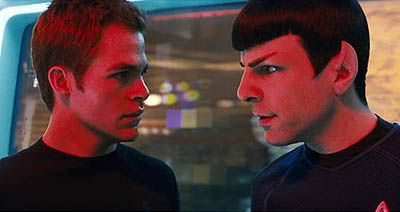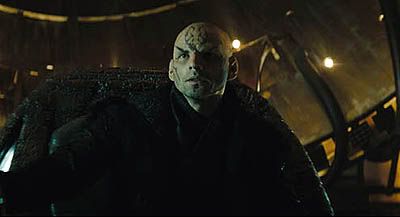
“Space, the final frontier.”
Those are the famous first words of the narration heard at the start of every episode of the original Star Trek TV series. But that was the 1960s, and over the course of four decades, 10 feature films and four more TV series, Star Trek lost that sense of wonder. Boldly going “where no one has gone before” had gotten boring. The last movie, Star Trek: Nemesis (2002), grossed only $43 million at the domestic box office. The most recent TV series, Enterprise, became, in 2005, the first since the original to be canceled.
Paramount’s long-running cash cow appeared to have been milked dry.
Not so fast.
Enter J.J. Abrams, creator of the TV series Alias and Lost, and director of the film Mission: Impossible III. Never a Trek fan at any point in his life, but that’s where screenwriters Roberto Orci and Alex Kurtzman (Transformers) and producer Damon Lindelof (Lost) come in.
It’s an ideal team to mastermind a reboot of the adventures of Kirk, Spock and the rest of the iconic crew of the USS Enterprise, a quartet that knows and respects the decades of Trek history but also has the ability to look at it with a more critical eye, as an outsider, and make it accessible to the non-Trekkers needed to make a $130-million production a success.
I have been a casual Trek fan over the years. I remember watching reruns of the original series with my mom when I was very young. I have seen all of the movies and enjoyed most of them on some level. The only subsequent TV series I followed closely was Deep Space Nine.
When it comes to the new film, called simply Star Trek, you can cross out the casual—I’m an enthusiastic fan. This is Star Trek as you’ve never seen it before—youthful, fast-paced, thrilling, funny and fueled by an adventurous spirit.
And yet it is still Star Trek. The faces have changed, but the characters so many have lived with for so long are instantly recognizable, whether it’s through Zachary Quinto’s uncanny physical resemblance to a young Leonard Nimoy or Karl Urban’s near-perfect mimicry of the late DeForest Kelley’s inflections in his line readings. Longtime fans will delight in the plethora of Easter eggs sprinkled throughout. And the presence of Nimoy as the elder Spock—who, along with a Romulan ship captained by Nero (Eric Bana), who blames Spock for his home world’s destruction, has traveled back in time roughly 120 years—provides a tangible link to Trek past.

The movie begins with the Romulans laying waste to the USS Kelvin, which is briefly under the command of George Kirk (Chris Hemsworth). In a heartbreaking, masterfully-edited sequence, he valiantly fights to save his crew, while his wife (Jennifer Morrison) gives birth to their son, who they call James Tiberius Kirk.
As a young man in rural Iowa, Jim Kirk (Chris Pine) is a motorcycle-riding hothead in a James Dean Rebel Without a Cause sort of way. When he takes on four Starfleet cadets in a bar fight after unsuccessfully flirting with Uhura (Zoe Saldana), Capt. Christopher Pike (Bruce Greenwood) sees more than a little of his father in him and urges him to enlist.
Three years later, Starfleet calls its cadets into emergency service to combat an imminent threat to the planet Vulcan—Nero is back and he’s even angrier than he was 25 years earlier. Kirk, recently caught cheating in a training simulation, is told to stay home. Fortunately, his friend, the crotchety Dr. Leonard “Bones” McCoy (Urban) sneaks him aboard the Enterprise.
All of the familiar faces are here: Spock (Quinto), the pointy-eared Vulcan, who serves as first officer; Communications Officer Uhura; helmsman Sulu (John Cho); and the young Russian, Chekov (Anton Yelchin). The engineer known as Scotty (Simon Pegg) joins them later.
Though there is at least one startling development, the movie is light on plot, heavy on back story and character interaction. At the fore is the relationship of Kirk and Spock. The two haven’t always been the best of friends. In fact, they are openly adversarial toward each other at first—Kirk so obviously driven by his emotions and Spock struggling to reconcile the logic that guides all Vulcans and the emotions of his human half.
Pine does not look or sound like William Shatner, but from the moment we see him in the bar, he simply is Kirk. He perfectly captures his brash swagger, his stubborn streak that won’t allow him to accept a no-win scenario. He also, especially in the early scenes, displays superb comic timing. A star is born—there’s no other way to put it.
Quinto (best known as the serial killer Sylar on TV’s Heroes) might have the most difficult task in the movie, given that the actor who originated his role also appears. His brooding Spock is a more complex individual than Nimoy’s, with his inner turmoil occasionally bubbling over into full-blown rage. He’s a long way from the Zen-like older Spock, but it makes sense given his mixed heritage and the events of this movie. There is even an unexpected romance for him.
By necessity, the rest of the cast appears in smaller doses, but even in their brief screen time, they are able to fully realize their characters. Pegg (Shaun of the Dead) is particularly effective, entering the movie at about the midpoint to provide comic relief at a time when the movie is growing increasingly grim.
Visually, the film is a marvel. Clearly, no expense was spared when it came to effects and production design, and it’s all gloriously captured by cinematographer Daniel Mindel. Star Trek, on television and in the movies, has always seemed to be a little on the cheap side when it comes to production values and staging its action scenes. Here it gets the full summer blockbuster treatment, and Abrams is a filmmaker who knows how to get it done. Star Trek has never had action this gripping. It’s never had such forward momentum.
In the end, Abrams’ Star Trek is everything a series reboot should be— true to the original while opening up future movies to worlds of possibilities. It is a grand adventure that smashes the walls the franchise spent so long building around itself. It has done the unthinkable: Star Trek is cool.
Grade: A
(Rated PG-13 for sci-fi action and violence, and brief sexual content. 126 minutes.)

No comments:
Post a Comment